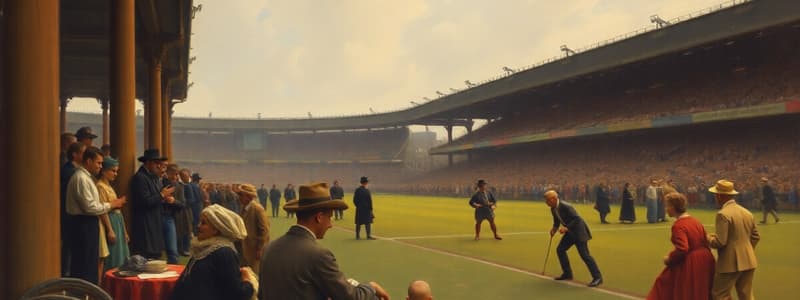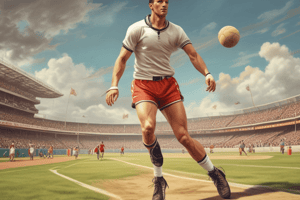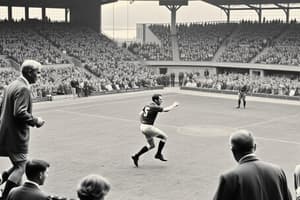Podcast
Questions and Answers
Which characteristic is NOT typically associated with the transformation of sport during the mid-19th century Industrial Revolution?
Which characteristic is NOT typically associated with the transformation of sport during the mid-19th century Industrial Revolution?
- Greater regulation of sporting activities.
- Emphasis on localized and informal play. (correct)
- Increased organization and structured rules.
- Heightened competitive individualism and achievement.
How did advancements in communication and transportation during the Industrial Revolution impact sports?
How did advancements in communication and transportation during the Industrial Revolution impact sports?
- They decreased media coverage, focusing only on local events.
- They enabled wider participation and dissemination of sports news. (correct)
- They limited participation to the elite due to increased travel costs.
- They made it more difficult to standardize rules across different regions.
Before the 19th century, what were the primary constraints on sports participation and information dissemination?
Before the 19th century, what were the primary constraints on sports participation and information dissemination?
- Geographic limitations and reliance on word-of-mouth. (correct)
- Strict regulations imposed by the government.
- Limited interest from the general population.
- High costs associated with sporting equipment.
How does the text describe or define 'modern' sport?
How does the text describe or define 'modern' sport?
What role has hockey played in the context of Canadian national identity?
What role has hockey played in the context of Canadian national identity?
In what way does professional hockey reinforce traditional notions of masculinity?
In what way does professional hockey reinforce traditional notions of masculinity?
Which of the following statements best describes the relationship between sports and beliefs about gender?
Which of the following statements best describes the relationship between sports and beliefs about gender?
What does the reference to capital accumulation, unequal class, power relations, commodification and hegemony suggest about the development of modern sport?
What does the reference to capital accumulation, unequal class, power relations, commodification and hegemony suggest about the development of modern sport?
Which question reflects the core focus of a historically sensitive approach to understanding sport and physical culture?
Which question reflects the core focus of a historically sensitive approach to understanding sport and physical culture?
When examining a contemporary issue in sports through a historical lens, which inquiry would be most relevant, according to the text?
When examining a contemporary issue in sports through a historical lens, which inquiry would be most relevant, according to the text?
What is one way that hockey functions beyond being merely a game in Canadian society?
What is one way that hockey functions beyond being merely a game in Canadian society?
Which question would a historian interested in the political implications of sport most likely ask?
Which question would a historian interested in the political implications of sport most likely ask?
The text suggests that sports are NOT developed in isolation. Instead, they are a reflection of, or response to what factors?
The text suggests that sports are NOT developed in isolation. Instead, they are a reflection of, or response to what factors?
What does 'historical sensitivity' enable individuals to do?
What does 'historical sensitivity' enable individuals to do?
How does the text characterize the connection between hockey and Canadian national identity?
How does the text characterize the connection between hockey and Canadian national identity?
What broader lessons do individuals learn through hockey, beyond just the rules and strategies of the game itself?
What broader lessons do individuals learn through hockey, beyond just the rules and strategies of the game itself?
Which argument was used to deny women the right to play hockey in the 1920s?
Which argument was used to deny women the right to play hockey in the 1920s?
How did Indigenous peoples' traditional games relate to their culture before European contact?
How did Indigenous peoples' traditional games relate to their culture before European contact?
According to Forsyth, what role did sports and games play in the residential school system?
According to Forsyth, what role did sports and games play in the residential school system?
What values were taught through hockey in the context of colonization?
What values were taught through hockey in the context of colonization?
When analyzing current moments in social historical context, what critical question should be considered regarding media coverage?
When analyzing current moments in social historical context, what critical question should be considered regarding media coverage?
When examining the social history of a particular event, which source of information is critical for understanding the decision-making process behind it?
When examining the social history of a particular event, which source of information is critical for understanding the decision-making process behind it?
Why is it important to bring together different perspectives when studying the social history of an event?
Why is it important to bring together different perspectives when studying the social history of an event?
What is the main goal of the applied learning task that involves writing about involvement or noninvolvement in physical play and sports?
What is the main goal of the applied learning task that involves writing about involvement or noninvolvement in physical play and sports?
Which of the following best describes the primary goal of critically self-reflecting on sports experiences, as suggested in the prompt?
Which of the following best describes the primary goal of critically self-reflecting on sports experiences, as suggested in the prompt?
Jason Laurendeau's work, 'Youth, Sport, and Colonial Selves,' encourages reflecting on the relationship between sport and broader societal structures. What is the MOST likely reason this perspective is included in the assignment prompt?
Jason Laurendeau's work, 'Youth, Sport, and Colonial Selves,' encourages reflecting on the relationship between sport and broader societal structures. What is the MOST likely reason this perspective is included in the assignment prompt?
Considering the assignment guidelines, which element would BEST demonstrate a strong critical analysis of a negative sports experience?
Considering the assignment guidelines, which element would BEST demonstrate a strong critical analysis of a negative sports experience?
How might someone apply the concept of 'social class' to analyze their early sports experiences (ages 4-12) as described in the prompt?
How might someone apply the concept of 'social class' to analyze their early sports experiences (ages 4-12) as described in the prompt?
The prompt asks about the influence of ideas about oneself and one's body on early sports experiences. Which of the following demonstrates the BEST understanding of this concept?
The prompt asks about the influence of ideas about oneself and one's body on early sports experiences. Which of the following demonstrates the BEST understanding of this concept?
If someone indicates that gender was not an important factor in their sports experiences, what is the MOST effective way to address this in their reflection, according to the prompt?
If someone indicates that gender was not an important factor in their sports experiences, what is the MOST effective way to address this in their reflection, according to the prompt?
The assignment asks you to consider how your sports experiences (or lack thereof) have influenced your life. Which of the following BEST represents a response demonstrating insightful analysis?
The assignment asks you to consider how your sports experiences (or lack thereof) have influenced your life. Which of the following BEST represents a response demonstrating insightful analysis?
What approach would demonstrate the least effective use of course readings and lecture materials in this assignment?
What approach would demonstrate the least effective use of course readings and lecture materials in this assignment?
Flashcards
Historical Roots
Historical Roots
All human actions and social structures are shaped by past traditions, norms, and values.
Historical Sensitivity
Historical Sensitivity
Understanding how social issues, interactions, and behaviors fit into historical narratives.
Sport's Context
Sport's Context
Sport reflects and responds to social, political, and economic issues in a country and worldwide.
Critical Questions for Historical Context
Critical Questions for Historical Context
Signup and view all the flashcards
Hockey and Canadian Identity
Hockey and Canadian Identity
Signup and view all the flashcards
Hockey as Social Practice
Hockey as Social Practice
Signup and view all the flashcards
Hockey's Lessons
Hockey's Lessons
Signup and view all the flashcards
Hockey as Socialization Agent
Hockey as Socialization Agent
Signup and view all the flashcards
Critical Self-Reflection
Critical Self-Reflection
Signup and view all the flashcards
Early Sports Context
Early Sports Context
Signup and view all the flashcards
Childhood Sports Ideas
Childhood Sports Ideas
Signup and view all the flashcards
Sports Inequality
Sports Inequality
Signup and view all the flashcards
Life-long Influence
Life-long Influence
Signup and view all the flashcards
Life Shaped by Sports
Life Shaped by Sports
Signup and view all the flashcards
Key Moments
Key Moments
Signup and view all the flashcards
Anticipated Future
Anticipated Future
Signup and view all the flashcards
Modern Sport (Definition)
Modern Sport (Definition)
Signup and view all the flashcards
Characteristics of "Modern" Sport
Characteristics of "Modern" Sport
Signup and view all the flashcards
History of Modern Sport
History of Modern Sport
Signup and view all the flashcards
Sport as a Cultural Form
Sport as a Cultural Form
Signup and view all the flashcards
Pre-19th Century Sport Accessibility
Pre-19th Century Sport Accessibility
Signup and view all the flashcards
Boost in Sporting Contests
Boost in Sporting Contests
Signup and view all the flashcards
Hockey's Role in Canadian Nationalism
Hockey's Role in Canadian Nationalism
Signup and view all the flashcards
Masculinity in Sport
Masculinity in Sport
Signup and view all the flashcards
Gender and Hockey
Gender and Hockey
Signup and view all the flashcards
Indigenous Games
Indigenous Games
Signup and view all the flashcards
Hockey as Colonization
Hockey as Colonization
Signup and view all the flashcards
Hockey's Educational Role
Hockey's Educational Role
Signup and view all the flashcards
Humboldt Broncos Crash
Humboldt Broncos Crash
Signup and view all the flashcards
PWHL
PWHL
Signup and view all the flashcards
Analyzing Social History
Analyzing Social History
Signup and view all the flashcards
Sports Socialization
Sports Socialization
Signup and view all the flashcards
Study Notes
- Human behaviors, decisions, and social structures have history and root themselves in traditions, norms, and values that constantly change.
- Political and cultural struggles form the backdrop.
- Poses questions about how society arrived at this moment, how governing bodies organize sport, what groups hold power, and why certain sports and athletes are culturally revered.
- Also questions when the history of sport in Canada begins and why certain sport ideologies have persisted.
Historical Sensitivity
- The ability to locate social issues and behaviors in history to understand the complexity of society.
- It recognizes that all moments have a history, which helps us understand the present and the future.
- Sport reflects and responds to social, political, and economic issues in Canada and worldwide, and does not develop in isolation.
Critical Questions for Social Historical Context
- How did the press cover an event or moment?
- What documents explain why decisions were made?
- How can different historical perspectives expose power relations and social structures?
- Social histories have ideological and political implications.
Hockey as a Social Construct
- Hockey is deeply embedded in Canadian national identity and in the identity of cities and communities.
- It is considered Canada's sport.
- Hockey is a social practice and institution that is connected to primary and secondary socialization.
- Hockey can be conceptualized as an agent of socialization, teaching life lessons about commitment, teamwork, merit, gender, race, and citizenship.
Development of Modern Sport
- Modern sport emerged from a mid-19th century Industrial Revolution, coinciding with advancements in manufacturing, agriculture, the textile industry, and transportation.
- Modern sport is organized, structured, and regulated, differing from pre-industrial localized sport.
- Is a history of capital accumulation, unequal class and power relations, commodification and hegemony
- Sport is also a cultural form characterized by competitive individualism and achievement, which privileges certain social groups over others.
Evolution of Communication and Access to Sport
- Prior to the 19th century, reaching sporting contests took a long time by foot, horse, or canoe.
- Wealthy members were the only ones with access to the leisure, travel and execution of sport.
- Contests occurred in close proximity, with news spread by word of mouth.
- Full-time sports reporters, both men and women, were onboarded to Canadian newspapers by the 1920s.
Hockey and National Identity
- Hockey is Canada's national winter sport and is understood as a defining aspect of Canadian identity.
- Hockey is embedded in discussions of Canadian nationhood and has been linked to stories of Canadian nation-building since the 1870s.
- It was formally recognized as the national winter sport in 1994
Gender in Hockey
- Hockey has reproduced the dominant notions of "manliness" through interactions between players and coaches.
- The traditional masculine gender role in sports is valued as strong, dominant, aggressive and even violent.
- Sports can reinforce beliefs about gender.
- Women and girls have a long history of playing hockey in Canada, but have struggled to gain legitimacy and resources.
- By the 1920s, women challenged the ideology that women are weak by playing aggressive hockey.
- These women were denied rights on the grounds that hockey was too rough for women and they should participate in sports such as tennis, swimming, skating, and track and field.
Indigenous Peoples and Hockey
- Indigenous people in Canada have a long tradition of physical games and contests connected to their land, ways of life, and survival skills.
- A history of playing traditional events at celebrations before European contact with Indigenous people.
- The Artic Winter Games also provide sporting opportunities.
Hockey and Colonization
- Sports and games are pivotal sites through which power was legitimized and exercised through Aboriginal bodies in the residential school system.
- Hockey taught patriotic values, appropriate masculine and feminine behaviors, and the colonizers' dominant norms and values.
Modern Hockey
- The Humboldt Broncos tragic crash and the social media outpouring is a current moment in modern hockey.
- The launch of the PWHL (Professional Women's Hockey League) 2023-2024 season.
Assignment Ideas
- Write 700-1000 words.
- Drawing on course readings and lecture material, write on experiences (or lack their of) in physical play, informal games, and organized sports.
- Students should be critically self-reflective: remember, describe, and analyze your sports experiences, the contexts in which they occurred, and the impact they had on you and others who were involved.
- Think back to childhood experiences of playing physical games and how they relate to age, social class, ethnicity, family, neighborhood, or community.
- Consider ideas about the individual's body and how it relates to experiences, gender, race/ethnicity, and social class in connection to participating in sports.
Studying That Suits You
Use AI to generate personalized quizzes and flashcards to suit your learning preferences.




